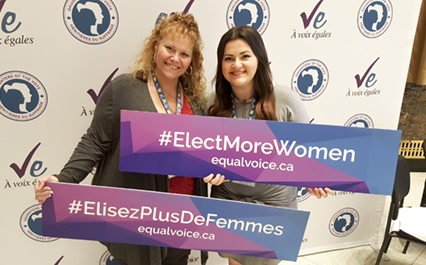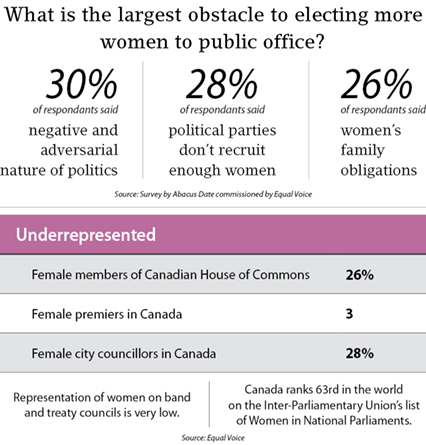Page Content
WINONA WALDRON
On March 8, a Daughters of the Vote delegate delivers an address in the House of Commons.
Conference raises awareness of gender inequality
Alberta teachers who attended the recent Daughters of the Vote event in Ottawa have returned to their classrooms inspired and ready to take action.
The four-day conference that took place March 6 to 10 saw 338 young women (one from each federal riding) participate in a series of information-sharing and policy-building events as part of a conference organized by the Canadian Teachers’ Federation in conjunction with the advocacy group Equal Voice.
“It was so inspiring to see young women that have that much energy and passion about our country and about making our country better,” said
Heather McCaig, a district representative on the Alberta Teachers’ Association’s Provincial Executive Council who was among a four-person contingent of ATA attendees.
Also representing the Association were district representatives Heide Doppmeier and Elaine Willette-Larson, as well as the Association’s information and privacy officer, Margaret Shane.
The marquee event came the morning of March 8 — International Women’s Day — when each participant occupied the House of Commons seat of her respective member of Parliament. After the group heard an address from former prime minister Kim Campbell, a selection of them voiced their concerns in the Parliament while teachers and other observers looked on from the gallery.
Among the presentations were an account of being raped and a summation of the dangers of Islamophobia. The participants, all aged between 18 and 23, also spoke about many other issues, including electoral reform, education funding for indigenous communities, affordable housing, climate change and the gender gap between men and women in politics.
McCaig said it was moving to hear the participants share such deep, personal stories and challenge the nation’s leaders to make a difference, a message she’s brought back to her classroom.
“I’ve already talked about it with all of my students and I’ve encouraged them to get involved in politics and look at anything they can do to make a change and be involved.”
The 338 participants were selected from more than 1,500 applicants from across Canada on the basis of their demonstrated leadership potential, interest in public policy issues and level of community engagement.
The young women were articulate, eloquent, passionate and supportive of each other to the point that even the speaker of the house was impressed and thought MPs could learn decorum from them all, Doppmeier said.
“I came away from this event with one certainty: our future is in extremely capable hands,” she said.
Willette-Larson said she found the event very moving and an affirmation of the importance of public education.
“It makes me double down on my efforts to champion public education,” she said. “It makes me reflect on what can I do to better represent and better serve the teachers of Alberta.”
The conference also included a policy development day with sessions facilitated by teachers and representatives from the CTF and its member organizations.
Study outlines challenges
The Daughters of the Vote event was convened to mark a century of women’s suffrage in Canada. The conference also coincided with the release of a study into Canadians’ beliefs about women in politics. The survey found that 58 per cent of Canadians think there are “too many” or “the right number” of women in Canadian politics, even though, on average, Canadians estimate that women occupy 31 per cent of the seats in the House of Commons. When the senate is included, women occupy only 26 per cent of the seats in Parliament.
“Clearly there’s still work to do educating Canadians on the issue of underrepresentation of women in Parliament, as well as other levels of government,” said Nancy Peckford, executive director of Equal Voice, an organization dedicated to electing more women political office.
The survey also found that a majority of Canadians believe it will take 18 years or longer for gender parity to arrive at the House of Commons, and 25 per cent think it will never happen.
When asked about the largest obstacle to electing more women to public office, 30 per cent responded that it’s the negative and adversarial nature of politics; 28 per cent said it’s because political parties don’t recruit enough women; and 26 per cent pointed to women’s family obligations.
While 32 per cent of women said political parties do not recruit women to run in winnable electoral districts, just 24 per cent of men chose that response. Only 13 per cent of millennials (respondents aged 18 to 36) attributed family obligations to preventing women from running for office, while 27 per cent of boomers (aged 53-plus) thought this was the biggest obstacle.
Most disturbing to the officials at Equal Voice, only 40 per cent of respondents said they would recommend a run for public office to a woman they know well, while 22 per cent would “definitely not recommend” a career in elected politics.
“It’s going to take way longer to reach parity than people think unless we make dramatic changes,” said Dr. Grace Lore, Equal Voice’s senior researcher.
“This is why initiatives like Daughters of the Vote are critical to accelerating progress to close the gender gap in politics and ensuring issues that matter to all Canadians are adequately represented at decision-making tables.” ❚

South East district representative Heather McCaig poses for a photo with Michela Glasco, a delegate from Medicine Hat, during the Daughters of the Vote conference in Ottawa.

